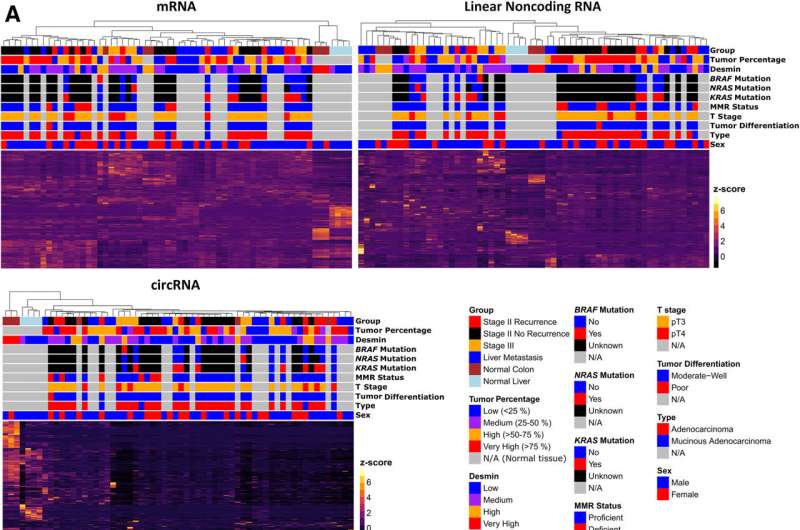This article has been reviewed according to Science X's editorial process and policies. Editors have highlighted the following attributes while ensuring the content's credibility:
fact-checked
peer-reviewed publication
trusted source
proofread
RNAs may help identify stage II colon cancer patients who could benefit from chemotherapy following surgery

The decision to treat patients with stage II colon cancer with adjuvant chemotherapy remains controversial. Therefore, there is an urgent need to identify reliable prognostic biomarkers that may be used to identify which patients would benefit from chemotherapy following surgery. In a study investigators have assessed the biomarker potential of RNAs in stage II colon cancer. Their findings appear in The American Journal of Pathology.
Lead investigator Lasse Sommer Kristensen, Ph.D., Department of Biomedicine, Aarhus University, explains, "There are currently no reliable biomarkers for determining whether stage II colon cancer patients would benefit from adjuvant chemotherapy following surgery. Identification of new risk-stratification biomarkers is beneficial—it may spare many patients who are actually cured by the surgery from toxic side effects of chemotherapy while still selecting patients who would benefit from it."
Using total RNA-sequencing, investigators profiled the landscape and differential expression of coding RNA, linear noncoding RNA, and circular RNA in stage II colon cancer patients with and without recurrence of the disease, as well as in stage III colon cancer patients. They also profiled adjacent normal tissues and liver metastases.
The biomarker potential of differentially expressed RNAs in stage II colon cancer was subsequently evaluated. Patient data collected included age, sex, date of surgery, chemotherapy treatment, tumor location, and date of recurrence. Histopathologic data were collected through the Danish Pathology Registry (Patobank) and included staging status, histologic subtype, tumor differentiation, mismatch repair status, and mutational analysis, if performed.
Sixty-two samples from 52 patients were included in the analysis: 18 patients with stage II colon cancer without recurrence, 10 patients with stage II colon cancer with recurrence, eight patients with stage III colon cancer with recurrence, 16 liver metastases, six adjacent normal colon tissues, and four adjacent normal liver tissues.
The investigators found that RNAs with housekeeping functions, such as small nuclear RNAs (snRNAs), small nucleolar RNAs (snoRNAs), and small Cajal body-specific RNAs (scaRNAs), were globally up-regulated in stage II patients who experienced recurrence compared to those who did not. Housekeeping RNAs are constitutively expressed and mostly involved in RNA splicing regulation and rRNA modification.
This is the first study to comprehensively describe the landscape of mRNAs, linear noncoding RNAs, and circular RNAs in local and locally advanced colon cancer and unveiled numerous differentially expressed RNAs across various classes between recurrent and nonrecurrent colon cancer. The expression of these RNA classes is retained in liver metastases, suggesting that they may play important roles in the metastatic process.
Dr. Kristensen notes, "We were the first to profile many different types of RNA in stage II colon cancer patients with different outcomes and discovered novel individual biomarkers as well as entire classes of RNA that are commonly deregulated in patients with poor outcomes. Furthermore, many of these classes of RNAs showed great prognostic potential to assist treatment decisions in stage II colon cancer that should be validated in larger groups of patients."
Colon cancer is the third most common cancer and the second most deadly cancer worldwide, with more than one million new cases and more than half a million estimated cancer-related deaths per year. A considerable number of colon cancer patients with local or local advanced disease suffer from recurrence.
Therefore, there is an urgent need for better prognostic biomarkers in this setting. Stage II colon cancer is defined by having penetrated the bowel wall, but without lymph node metastases or distant metastases at the time of diagnosis.
More information: Ulrik Korsgaard et al, The Transcriptional Landscape of Coding and Noncoding RNAs in Recurrent and Nonrecurrent Colon Cancer, The American Journal of Pathology (2024). DOI: 10.1016/j.ajpath.2024.04.003


















